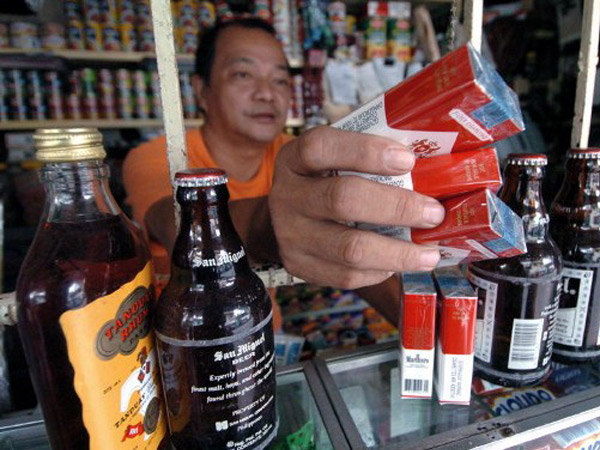The excise taxes collected from so-called “sin” products jumped by more than 20 percent in July on the back of higher rates implemented this year and improved compliance by taxpayers.
Data from the Bureau of Internal Revenue (BIR) provided by Commissioner Kim S. Jacinto-Henares showed that excise tax collections from cigarettes and alcohol products in July rose by 20.9 percent to P12.3 billion from P10.2 billion a year ago.
The take from tobacco products that month rose by 23.4 percent to P9.2 billion from P7.4 billion in July last year.
From alcoholic drinks such as distilled spirits and fermented liquor, the BIR collected P3.1 billion, up 14.1 percent from P2.7 billion last year.
As of end-July, excise tax collections from cigarettes and alcohol products totaled P65.7 billion, 17.1-percent higher than the P56.1 billion collected in the first seven months of 2014.
The take from sin products jumped due to higher rates slapped this year under Republic Act No. 10351 or the Sin Tax Reform Law enacted in 2012.
The law restructured the excise taxes on alcohol and tobacco, with higher tax rates slapped on these products to discourage vice while also collecting more revenues to be poured into health care.
Under RA 10351, cigarette packs that cost below P11.50 are to be taxed P21 this year, up from P17 last year, while those that are priced P11.50 and above are slapped P28, up from P27.
Fermented liquor that cost less than P50.60 per liter are now taxed an additional P19 (from P17 last year), while those priced above P50.60 are slapped P22 (from P21).
Distilled spirits are levied P20 plus 20 percent of the net retail price per proof, from P20 plus 15 percent last year.
Also, the BIR has tightened monitoring of tobacco makers’ tax payments through the Internal Revenue Stamps Integrated System or Irsis. This system would also cover alcohol products before the end of the year, Henares said.
The Department of Finance (DOF) noted that the Sin Tax Reform Law “fixed long-standing structural weaknesses related to the taxation of tobacco and alcohol products.”
In the first two years of its implementation, sin tax reform raised an additional P104 billion to finance the country’s universal health care programs.
This year, the BIR aims to collect P1.674 trillion in taxes, of which P140.4 billion should come from excise taxes on alcohol, minerals, motor vehicles, petroleum and tobacco.
